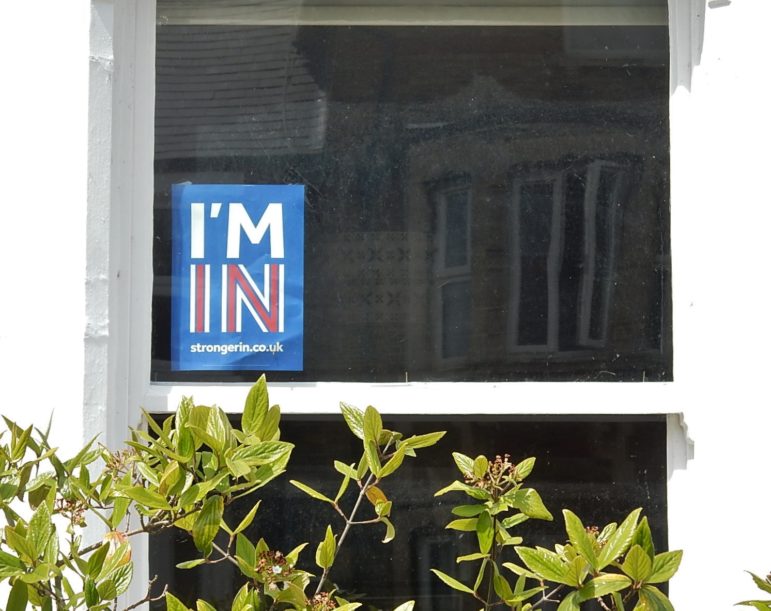
June 26, 2016; Rolling Stone
Writing for Rolling Stone, Katherine Cross warns U.S. voters against bitter or clueless ballot protests, which made up a small but considerable part of the “Brexit” referendum on whether the UK should remain as part of the European Union. In doing so, she is speculating, of course, about the direction Sanders voters will turn, which appears to be toward Hillary Clinton.
The Brexit vote took the UK by surprise; approximately 70 percent of all voters, and 54 percent of pro-Brexit voters anticipated the referendum to fail. Brian Fung, reporting for the Washington Post, writes that in the UK, amid official resignations from government officials and an economy skidding off the road, the 250 percent uptick in Britons Googling to find out what the EU is after the vote to leave last week could be interpreted as an indication of an “Oh…what?” moment.
“Even though I voted to leave, this morning I woke up and I just—the reality did actually hit me,” one woman told the news channel ITV News. “If I’d had the opportunity to vote again, it would be to stay.”
(Then again, that surge amounts to about a thousand people, more reflective of researchers than a wave of regret.)
International Business Times reports similar reactions. One man confessed he really had no idea that his “leave” vote would count, and is now “quite worried.” Even Kelvin MacKenzie, the former editor of the Sun, admitted to feeling “buyer’s remorse” after voting for Britain to leave the EU.
Sign up for our free newsletters
Subscribe to NPQ's newsletters to have our top stories delivered directly to your inbox.
By signing up, you agree to our privacy policy and terms of use, and to receive messages from NPQ and our partners.
Now, the bed has been made with a 52% to 48% vote, and those “regrexiters” will have to find reasons to throw away that bitter ballot. One petition, posted on a British government website on September 25th, now shows 4 million signatures. It reads, “We the undersigned call upon HM Government to implement a rule that if the remain or leave vote is less than 60% based a turnout less than 75% there should be another referendum.” The site says that Parliament considers all petitions that get more than 100,000 signatures for debate, and Government responds to all petitions that get more than 10,000 signatures.
But has the die been cast too long to be withdrawn? The EU’s remaining 27 members will now decide how aggressive they will be in making demands to the UK should it pull the trigger on invoking Article 50 of the Lisbon Treaty of 2007 and proceeding to leave. After that will follow two years of negotiations about the terms of Britain’s future relationship with Europe. In other words, time remains for the British electorate’s fateful decision to play out.
Cross’s argument against “protest votes” in general and the Brexit in particular concludes with this warning:
For all those who think Bernie-or-bust is reasonable, I urge them to consider what has been awakened across Europe. Justice will not be served by bitter or clueless ballot protests—but darker forces will be very grateful for your support. And there will be no time for regrets.
In a perfect world, the “protest vote” can be principled and true, but in our fractured world it can be lamentable. Thoughtful and intentional voting matters because each generation must fight for and win cherished rights, benefits, freedoms, and liberties. Every vote matters, which is why not voting to avoid the lesser of two perceived evils is just as problematic as the “protest vote.”—Ruth McCambridge













